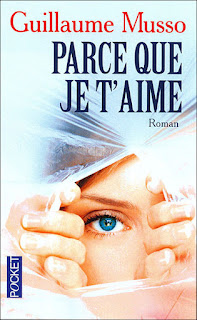Parce que je t'aime - Guillaume Musso
First you get a hold up on a Manhattan street where a famous violinist and her companion are threatened by a mugger while out for a walk after her performance at a concert. Nicole Hathaway is very nearly killed in the incident, saved only by a homeless person springing up, tackling the assailant and saving her from getting her throat cut. Incredibly, the homelessness person turns out to be Mark Hathaway, her husband who left her three years ago in a state of depression at being unable to deal with the disappearance of their child Layla. Mark remained convinced she was still alive despite everyone else accepting that after a year of her going missing there was no hope of her return.
This incident is followed by another attempted mugging on the same night against Mark's former psychologist colleague Connor. While Nicole is desperately trying to contact Connor about Mark resurfacing, he is the victim of an attempted theft by a 15-year-old girl on the streets. Capturing the girl and trying to help her, Connor finds out that she is looking for money not to survive but to buy a gun to take revenge on someone. Soon after this, just as Mark has never given up hope, the news comes in that Layla has been recovered and is indeed still alive. What is even more incredible is that she has reappeared in the same LA shopping mall to the day and hour she went missing exactly 5 years ago. For some mysterious reason however, Nicole excuses herself from flying with Mark to LA to recover her.
The extraordinary events - without giving much away - continue to accumulate as Mark takes a silent Layla back on the flight from LA. Also on-board, are a famous wild child heiress Alyson Harrison, and Evie Harper, the young girl Connor encountered recently on the streets. Unknown to each other, all of the characters are however connected in ways that are hinted at but yet to be revealed. The larger part of the book then is told in flashback over the course of the flight back, alternatively taking the perspective of individual characters to show what had led them to this point. How did they all come to be on the same plane? Enormous coincidences, some kind of plan or a huge conspiracy of some kind? Clearly there is a bigger picture here that no one really understands, although you would expect them to be more surprised than they actually are.
It’s interesting to me that Guillaume Musso is not characterised as a thriller writer, or at least I was surprised that there were none of his books in the crime/thriller, policier/polar section of the Gibert Jeune shops in France, so I had to go and look at the general fiction section where this book is categoried simply as a 'roman', a novel. It’s possibly because Musso is seen as a mainstream bestseller writer rather than a genre writer - although the crime genre remains popular and practically mainstream in France as it does in the UK - but maybe it’s because his works transcend the genre? Or play on the genre maybe with its grand gestures that belong to high romanticism?
Whatever Musso does and however you want to describe it, he does it compellingly. Every chapter in Parce que je t'aime brings an extraordinary twist or a major a flashback revelation that is completely unexpected and unpredictable because you would not believe such contrivance or coincidence possible. Despite my reservations, having read Musso's more recent L'Inconnue de la Seine, having seen what he could pull off there and simply for the sheer nerve of taking it where he does, I was happy to go along with this in Parce que je t'aime.
Does he succeed in taking it through to an equally inventive conclusion that makes it all credible and worthwhile? Well, a lot of readers in France have been moved by the book and rate it very highly. For me personally, notwithstanding the intriguing plot and the deeper psychological issues explored (in a conventional and superficial manner), I'm afraid the conclusion turns out to be ludicrous and a total letdown, a variation on a twist that has been done many times before, only rarely as sentimentally as it is handled here. Which might perhaps be the reason why Guillaume Musso is not viewed as a dark crime thriller writer after all, as he has nothing to add to the genre here.
Reading notes: Although one of the biggest bestsellers in France, I don't think Parce que je t'aime by Guillaume Musso has been translated into English. I read a French paperback edition published by Pocket. Despite my disappointment with this, I don't think I'll give up on Musso yet. As mentioned above, I've also read L'Inconnue de la Seine and it is terrific, so I'll keep looking in case there is another good one out there.




Comments
Post a Comment